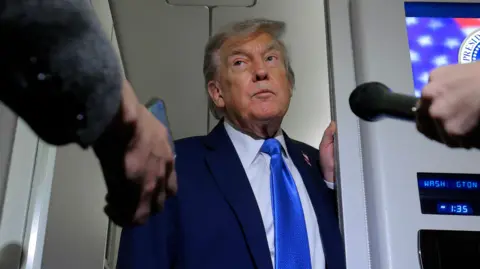The ongoing geopolitical situation regarding Iran has led to serious internal divisions within President Donald Trump’s administration and among his supporters. Central to this debate is the question of whether the United States should align with Israel in a military attack against Iran or refrain from such military action altogether. This dilemma was recently articulated by Trump himself when he stated, “I may do it, I may not do it,” while discussing the potential targeting of Iranian nuclear sites. This ambiguity reflects the broader conflict between interventionist and isolationist ideologies that have long resided within the Republican Party.
Historically, Trump has voiced his opposition to what he terms “stupid endless wars” in the Middle East. However, he also insists that Iran must be prevented from acquiring nuclear weapons, creating a precarious balancing act for his administration. Currently, he seems caught between two factions of his base: the hawks, who advocate for aggressive military action, and the isolationists, who prefer to avoid foreign entanglements. The intensity of this internal conflict has grown as key figures within the administration offer contrasting assessments of the Iranian threat.
One notable voice in the debate is Tulsi Gabbard, Trump’s Director of National Intelligence. Gabbard testified before Congress that while Iran’s enriched uranium levels are concerning, experts do not believe the nation is actively pursuing a nuclear weapon. Additionally, she has expressed concerns that political elites are stoking unnecessary fears that could lead to needless conflict. These remarks, alongside a video where she cautioned against the rising tensions with Iran, reportedly angered Trump, who asserted that he believes Iran is close to acquiring a nuclear weapon.
These contrasting views highlight the rift within the GOP regarding potential U.S. involvement in the Iran-Israel conflict. Notably, Republican Congressman Thomas Massie of Kentucky introduced legislation aimed at curtailing Trump’s ability to engage U.S. forces in military actions against Iran without congressional approval. He articulated his stance by stating that such matters of war should be decided by Congress per the Constitution, emphasizing a reluctance to enter another war in the Middle East.
This growing strain within Trump’s base extends to the media and political commentators as well. Notably, former Fox News host Tucker Carlson has openly criticized any call for U.S. intervention in conflicts like that in Iran, labeling proponents of war with the term “warmongers.” Carlson’s critique has caused friction with Trump, who dismissed Carlson’s views as “kooky.” This public disagreement was further evidenced by a heated confrontation between Carlson and Texas Senator Ted Cruz, highlighting the passionate and often divisive nature of the discussion.
As the conflict escalates, other notable figures, like South Carolina Senator Lindsey Graham, advocate for intervening in Iran, framing it as a matter of national security. In contrast, more isolationist voices within the party have warned of dire political implications if the U.S. were to become embroiled in conflicts in the Middle East once more. The dynamic has culminated in a significant public discussion about the potential ramifications of military action in Iran, including the political fallout for Republicans stuck between hawkish and isolationist camps.
Polls indicate a majority of Trump’s voter base would support U.S. assistance to Israel in targeting Iran, yet there remains a strong undercurrent of skepticism about involvement in foreign wars. Many Trump supporters fear the repercussions of military entanglements and echo sentiments like those found on his Truth Social platform, where calls for “America First” prevail.
Ultimately, as tensions in the Iran-Israel conflict continue to escalate, it appears Trump’s administration may soon be faced with a defining decision regarding whether to pursue a military path or maintain a stance of non-intervention. This choice presents a significant crossroads for the Trump administration, encapsulating the complex interplay of various ideologies within the Republican Party and the broader implications for U.S. foreign policy.



